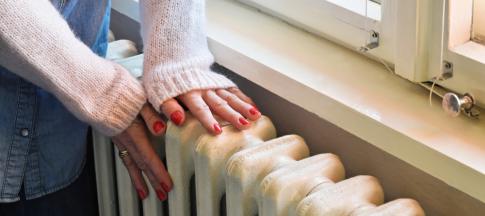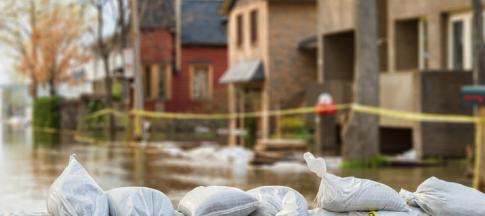
In the UK, winters can get bitterly cold, and it’s not uncommon for temperatures to fall below freezing.
To avoid cold weather affecting your home, there are a few things you can do to prepare and keep your house safe from winter’s effects.
Preparing the outside of your home for winter weather
Start getting winter ready by bringing loose garden items inside and securing them.
If you have trees in your garden, trim them before bad weather hits.
You should also check:
- roof tiles – check out our guide on how to look for roof damage
- fences and outbuildings – fences aren’t covered for storm damage by Admiral’s home insurance
- the bricks, rendering and mortar of your walls and chimney
- aerials, satellite dishes and solar panels
- any leaking taps – we also recommend isolating non-leaking taps to prevent frost damage
We recommend putting together an emergency kit to make sure you have everything you need during a power cut. It should contain:
- important documents
- torch
- spare batteries
- first aid kit
- instant heat packs
How to insulate your home
1. Insulation for your attic and walls
Efficient loft and wall cavity insulation are key to creating an insulated home.
Insulation doesn't have to be an expense; there are several government grants available that can pay for the installation. Check with your local council to see what grants are on offer.
2. Draught excluders
Prevent heat from escaping through windows and doors by sealing gaps with adhesive tape and using draught excluders on doors.
Maintain and service gas fires and solid fuel burners properly. Letterbox brushes, chimney balloons and keyhole coverings can make a real difference too.
3. Looking after your water tank
Insulating the top and sides of your water tank with sheets or a jacket filled with glass fibre matting will save you energy and money.
4. Lag pipes
Insulating your pipes with tubing, known as “lagging”, saves heat and you can fit it yourself.
Lagging pipes also helps prevent freezing pipes. Focus on hot water pipes from your boiler or cylinder.
5. Bleed radiators
If you haven’t turned your heating on for a while, air can enter the system and form bubbles at the top of your radiators, which stops them from working efficiently.
Bleeding radiators helps them work better which can save you money on your heating bills.
6. Upgrade your thermostat to a smart meter
We recommend getting an up-to-date thermostat to help keep your home warm. Outdated or old thermostats are less reliable and increase your home's heating and cooling expenses.
Many modern thermostats have features to make your heating more efficient and allow you to turn the heating on or off while you’re away from home.
7. Soft furnishings for warmth
Hanging curtains and laying rugs on hard floors can warm your home because the thick material prevents heat from escaping through windows and doors. Layering materials can also improve heat insulation.
You should also open your curtains during the daytime to naturally warm your property.
How to prevent frozen pipes
- find the location – always know where your stop valve is
- keep your boiler running - while we understand the challenges of rising fuel prices, we recommend leaving your boiler on a freeze protection mode, low constant or a timer setting
- lag your pipes – as mentioned, lagging can prevent freezing
- check for and fix drips and leaks – drips and leaks increase the chance of your pipes freezing
- bleed radiators – bleeding radiators improve your boiler’s efficiency, meaning pipes are less likely to go cold and freeze
- use heat tape around your pipes’ exterior
- drain your systems if you’re going away over winter – this eliminates the chance of frozen pipes
What to do if your boiler pipes have frozen
If your boiler won't work, it might be caused by a frozen condensate pipe. The condensate pipe transports the condensation from your boiler to the drain outside. It’s usually plastic.
There are a few clear signs it’s frozen:
- you hear a gurgling sound from the boiler
- your boiler presents an error code, usually EA
Try these steps to defrost your condensate pipe before calling anyone:
- hold a hot water bottle against the pipe or pour hot – not boiling – water over the frozen end of the pipe with a kettle or watering can
- switch the boiler on again and see if it fires up. If it does, it's fixed. If not, repeat the previous step
Dealing with temporarily frozen pipes isn’t covered under Home Emergency or Home Emergency Extra cover. However, Admiral’s Buildings Insurance may provide cover for frost damage to pipes and plumbing inside the home, as a result of freezing. Check your policy documents to see if you’re covered.
Learn more about frozen pipes in our article how extreme weather affects your home.
What to do if your frozen pipes burst
- turn off the water at the main stop valve and switch off the central heating
- drain cold water systems by flushing your toilet several times and running all cold taps until the flow dries up
- thaw the pipe from the tap side of the frozen section by gently warming it and working back towards the header tank
- turn off the main electrical supply if electrical sockets are impacted (don’t touch any electrics or wiring, and call an electrician)
- move any furniture away from the leak
- leave windows and internal doors open if it's safe to do so, as this will help your property dry out and prevent mould
- use a dehumidifier to remove excess moisture from the air
What’s trace and access cover?
Most home insurance policies feature trace and access cover, usually as part of buildings insurance.
Trace and access cover works well in winter as it covers the costs of sourcing and isolating a leak for repair, allowing you to potentially fix the leak before the pipe freezes.
Read more about how trace and access cover helps you in wintertime.
Protecting against lightning damage to electronics
Lightning often strikes TV aerials and satellite dishes, which damages anything connected to them such as:
- TVs
- games consoles
- routers
- monitors
- computers
- smart home hubs
Unplug your electronics in a storm or invest in a surge protector, which extension leads often include.
After the storm – home and garden checklist
Find out more about what to do during a storm and what to check afterwards on our storm weather hub.
The roof
When it’s safe to do so, stand back to check your roof and note if there are any visible problems like missing tiles or damaged flashing (the flat, thin pieces of metal that waterproof certain areas of the roof).
From the inside of your loft, check whether the roof is sagging, if you can see light from outside or any patches of dampness.
Windows in your garden shed
Check your greenhouse, conservatory or outbuilding glass.
Strong winds could have caused branches to bang against windows and cause cracks, while heavy rain may have leaked through, highlighting weak spots.
Learn more about looking after your garden shed in our guide.
Your garden
Look around for any damage, like broken furniture. Make a note of it and clear out any debris if it’s safe to do so.
Investigate any trees for loose branches or exposed roots, too. We can’t cover you if an already-damaged tree causes problems.
We have a separate guide on gardens and home insurance.
Guttering
Loose tiles or debris from the roof could slip into the guttering and cause a blockage. It's important you clear any guttering after snow has hit.
Any moss or leaves in your guttering will be prone to freezing, so clear them out. Get rid of anything that can weigh down your guttering and block or crack the pipes.
We have a four-step guide to gutter clearing.
Boundary walls
Many home insurance policies (including Admiral’s) exclude cover for fences, gates or hedges but may be able to help with cover for boundary walls blown down by stormy weather.
Please check your insurance policy documents to see if you’re covered with your plan.
Flood damage
Once the flood waters have subsided and it’s safe to return home, open your windows and air out your property if it's safe to do so.
Check out our flood guide for a full list of what you'll need to do.
How to claim on your home insurance
Claiming on your home insurance takes a few steps. If you’re an Admiral customer you should:
- review your insurance documents to see that the loss or damage is covered
- check your policy excess to see if you can make a claim
- visit our make a claim page or call us on 0333 220 2035
- tell us your policy number, incident date and the cause of damage


